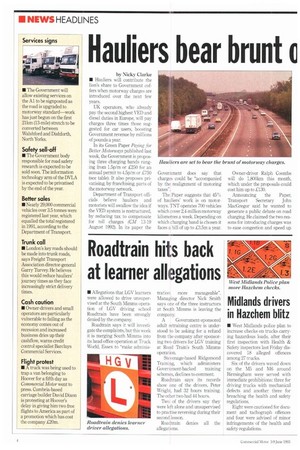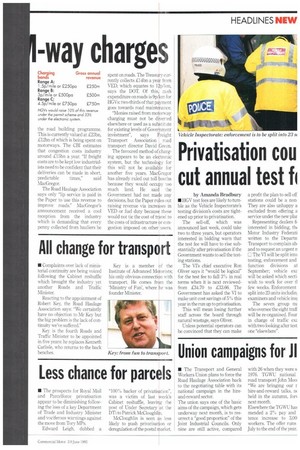Hauliers bear brunt c -way charges
Page 6

Page 7

If you've noticed an error in this article please click here to report it so we can fix it.
by Nicky Clarke • Hauliers will contribute the lion's share to Government coffers when motorway charges are introduced over the next few years.
UK operators, who already pay the second highest VED and diesel duties in Europe, will pay charges three times those suggested for car users, boosting Government revenue by millions of pounds a year.
In its Green Paper Paying for Better Motorways published last week, the Government is proposing three charging bands ranging from 1.5p/m or £250 for an annual permit to 4.5p/m or £750 (see table). It also proposes privatising, by franchising, parts of the motorway network.
Department of Transport officials believe hauliers and motorists will swallow the idea if the VED system is restructured, by reducing tax to compensate for toll charges (CM 13-19 August 1992). In its paper the
Government does say that charges could be "accompanied by the realignment of motoring taxes".
The Paper suggests that 45% of hauliers work is on motorways. TNT operates 700 vehicles which cover 2.4-million motorway kilometres a week. Depending on which charging band is chosen it faces a bill of up to £3.5m a year.
Owner-driver Ralph Coombs will do 1,800km this month, which under the proposals could cost him up to £130.
Announcing the Paper, Transport Secretary John MacGregor said he wanted to generate a public debate on road charging. He claimed the two reasons for introducing charges was to ease congestion and speed up
the road building programme. This is currently valued at ,C23bn, .C12bn of which is being spent on motorways. The CBI estimates that congestion costs industry around E15bn a year. If freight costs are to be kept low industrialists need to be confident that their deliveries can be made in short,
predictable times," said MacGregor.
The Road Haulage Association says only lip service is paid in the Paper to use this revenue to improve roads." IVIacGregor's announcement received a cool reception from the industry which is demanding that every penny collected from hauliers be spent on roads. The Treasury currently collects £14bn a year from VED, which equates to 12pik m, says the DOT. Of this, cash expenditure on roads is 9p/km for HGVs: two-thirds of that payment goes towards road maintenance.
"Monies raised from motorway charging must not be divered elsewhere or used as a substitute for existing levels of Government investment", says Freight Transport Association road transport director David Green.
The favoured method of charging appears to be an electronic system, but the technology for this will not be available for another five years. MacGreg;T has already ruled out toll boo . because they would occupy ..00 much land. He said he Government had not made any decisions, but the Paper rules out raising revenue via increases in VED or fuel duty because these would not tie the cost of travel to the costs of infrastructure or congestion imposed on other users.




















































































